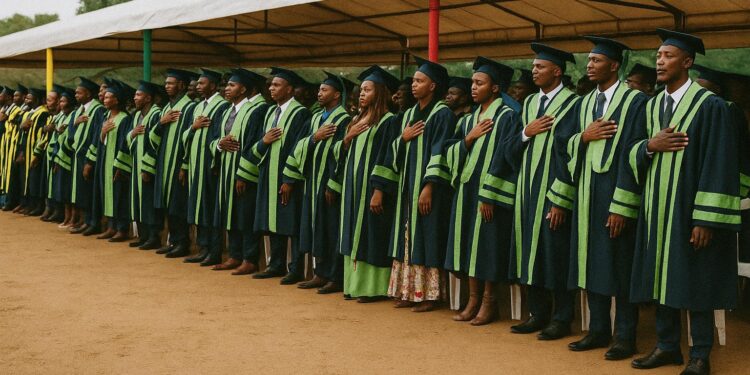Ceremony in Kintélé Celebrates Academic Milestone
The midsummer convocation at the Denis Sassou-Nguesso University campus unfolded with the measured gravitas that now characterises the Republic of Congo’s major academic events. Under the tropical sky of Kintélé, 405 laureates—294 at bachelor level and 111 at master level—crossed the stage to receive diplomas bearing the seal of a fledgling but fast-growing institution. Their emergence, only three years after the university’s inauguration, is a tangible illustration of Brazzaville’s intention to anchor economic modernisation in an increasingly sophisticated pool of national expertise.
A Snapshot of Academic Performance and Merit
Within the graduating cohort, institutional statistics reveal a pass rate exceeding ninety-six percent across three faculties, while the Institute of Architecture, Urbanism, Construction and Public Works posted an unblemished record. Salutatorians Ngantso Anne Laure Emmanuelle and Malonga Mpoussika Beldon both posted averages above 15 on the Congolese twenty-point scale, benchmarks that resonate with continental norms set by the Association of African Universities. The performance vindicates a targeted blend of selective admissions and continuous assessment introduced in 2022, mirroring recommendations of the African Union’s Continental Education Strategy.
Government Signals on Human Capital and Emergence
Prime Minister Anatole Collinet Makosso used the rostrum to reiterate that ‘excellence remains the shortest path towards emergence’. His phrasing deliberately echoed the National Development Plan 2022-2026, which allocates almost nine percent of public expenditure to higher education (World Bank public spending dataset, 2023). For the premier, the new graduates constitute ‘proof that Congo’s demographic dividend can be translated into productive capacity provided the requisite laboratories, libraries and bursaries are sustained’. Such messaging aligns with state efforts to channel young talent into infrastructure, extractive industries and the creative sector, areas singled out by the IMF as potential growth accelerators.
Ministerial Perspective on Institutional Consolidation
Minister of Higher Education, Scientific Research and Technological Innovation, Emmanuelle Delphine Edith, recalled that the institution has entered what she called its ‘cruise-speed phase’. Her ministry’s quarterly bulletin lists the recent acquisition of geospatial imaging equipment, the commissioning of a hydraulics laboratory and the rollout of an internal quality-assurance policy based on four thematic pillars: governance, pedagogy, research impact and societal engagement. These developments offer empirical support to UNESCO’s observation that African universities with structured quality frameworks tend to post improved employability outcomes.
Strategic Expansion: Mines, Hydraulics and Energy School
President of the university, Professor Ange Antoine Abena, announced the operationalisation of the new School of Mines, Hydraulics and Energy from the next academic year. The curriculum, he explained, has been calibrated to national priorities ranging from the Pointe-Noire deep-water port expansion to the solar electrification of inland prefectures. By embedding fieldwork modules with public-private consortia, the institution hopes to reduce the lag that frequently separates graduation from first employment in Central Africa, estimated at twenty-two months by the African Development Bank.
Research Themes Anchored in National Development Issues
The master theses defended this year address questions at the heart of policy discourse: integrated urban development in Kintélé, coastal erosion in Louango, gender-responsive public architecture and the correlation between transport corridors and urban mobility. Such alignment affirms a broader continental shift from purely descriptive research to problem-solving methodologies advocated by the African Research Universities Alliance. Three top graduates per programme, alongside the overall best female student, have already been earmarked for junior faculty positions, ensuring a forward loop of academic renewal.
Labour-Market Absorption and the Private-Sector Imperative
Student union president Thierry Ngouama reminded attending CEOs that the private sector retains a decisive role in translating degrees into development dividends. Congo’s formal labour market recorded a 4.8 percent vacancy rate in technical professions last year (National Employment Observatory, 2023). By recruiting architects, surveyors and environmental scientists from the current cohort, corporate actors can simultaneously address skills gaps and participate in the state’s diversification strategy away from hydrocarbon dependence.
Regional Significance and Soft-Power Considerations
The steady maturation of UDSN carries implications beyond national borders. Brazzaville now hosts a Centre of Excellence in Geomatics recognised by the Economic Community of Central African States, enhancing Congo’s soft-power portfolio in a region where educational diplomacy is increasingly salient. Delegations from Gabon and the Democratic Republic of Congo attended the ceremony, exploring dual-degree partnerships that could ease student mobility under the CEMAC mutual recognition framework.
An Eye to the Horizon
As the campus emptied and fresh alumni posed for photographs, the broader narrative was unmistakable: in a global economy animated by knowledge flows, Brazzaville is positioning itself as both supplier and integrator of advanced skills. While infrastructure outlays and faculty development will continue to test public finances, the diplomatic dividends of a robust national university—ranging from regional esteem to reduced brain drain—appear substantial. For the 405 new degree holders, the horizon is less a distant line than an unfolding set of possibilities, bordered only by the country’s collective resolve to convert education into enduring prosperity.











































